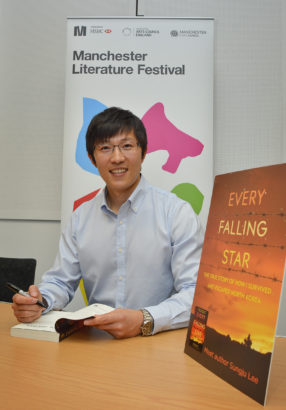 MLF Chapter & Verse
MLF Chapter & Verse
The Manchester Literature Festival Blog
Review: Sungju Lee
Festival blogger Amy McCauley headed to Central Library to hear Sungju Lee read and discuss his memoir, co-written by author and journalist Susan Elizabeth McClellan, Every Falling Star.
What do we imagine when we think of North Korea? Perhaps a chubby cartoon of Kim Jong-Un astride a nuclear missile; or a ‘Team America’ style caricature of Kim Jong-Il in thrall to the Western luxuries he denies his own citizens. Either way, our first thoughts – inevitably shaped by portrayals of a crazed dictator – probably draw on vague and rather reductive ideas of a repressive state governed by an unstable tyrant. But as author Sungju Lee told a packed house at Manchester’s Central Library on Saturday, this image of North Korea relies on a one-sided narrative which dehumanises the very real suffering of North Korea’s population.
Speaking to a captivated audience, Sungju shared his experiences of living first in the capital city of Pyeong Yang – where citizens have access to gas, electricity and a slick public transport system – and then, following his family’s expulsion from the capital (Sungju Lee’s father was reported by a colleague for saying “there’s no hope in North Korea”) of living in the province town of Kyongseong.
In stark contrast to life in the capital city, Lee described life in the provinces as a matter of simply surviving from one day to the next. This struggle to survive – without access to oil, gas or food supplies – led to Lee’s father killing rabbits and snakes in order to feed his family; and, while this kept the family alive for a while, his parents grew so desperate for food they were left with no option but to leave their son and search for food elsewhere.
After his parents failed to return, Lee – who was suffering from malnutrition – was befriended by a young street thief who encouraged him to join a local gang, steal food and survive. At just 12 years old Lee thus embarked upon a gang career, finding support and protection from his ‘brothers.’ In a remarkable twist in the story, Lee happened upon his grandfather – who recognised his grandson immediately – and so the chain of events which would lead Sungju towards freedom were set in motion.
This journey, which Lee documents in his book Every Falling Star, saw him escape first into South Korea and then to North America. As he expressed his feelings of surprise and bewilderment at South Korean social norms, his powerful account of culture shock held the audience spellbound. From public displays of affection to traffic jams; television sets to cell phones, Lee’s sense of disorientation was palpable. This served to illustrate just how isolated North Koreans really are, while Lee’s comparison of North Korea with the world evoked in ‘The Hunger Games’ underscored the need for human rights abuses to be taken seriously.
Lee closed with an appeal for journalists to speak to North Korean defectors, saying he hoped his book (co-authored with Susan Elizabeth McClelland) would prompt the international community to seek out the truth beyond satirical depictions of the country’s leaders. Without doubt, this Manchester audience was moved and inspired by Lee’s frank and compelling story.
___
Amy McCauley won a Northern Writers’ Award (2016) and is Poetry Editor for New Welsh Review. You can read more of her writing here.
